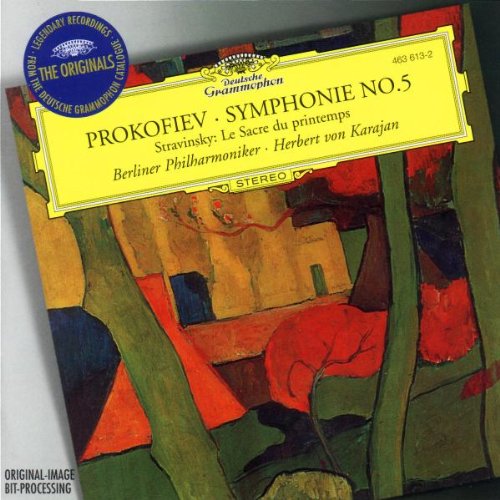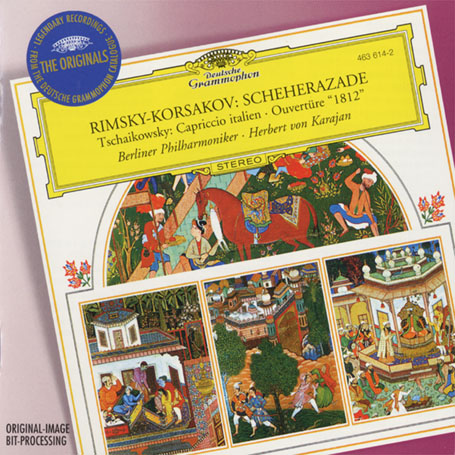PROKOFIEV Symphony No 5; STRAVINSKY Rite of Spring (Karajan)
View record and artist detailsRecord and Artist Details
Composer or Director: Igor Stravinsky, Sergey Prokofiev
Genre:
Orchestral
Label: The Originals
Magazine Review Date: 12/2000
Media Format: CD or Download
Media Runtime: 78
Mastering:
ADD
Catalogue Number: 463 613-2GOR

Tracks:
| Composition | Artist Credit |
|---|---|
| Symphony No. 5 |
Sergey Prokofiev, Composer
Berlin Philharmonic Orchestra Herbert von Karajan, Conductor Sergey Prokofiev, Composer |
| (The) Rite of Spring, '(Le) sacre du printemps' |
Igor Stravinsky, Composer
Berlin Philharmonic Orchestra Herbert von Karajan, Conductor Igor Stravinsky, Composer |
Composer or Director: Nikolay Rimsky-Korsakov, Pyotr Ilyich Tchaikovsky
Label: The Originals
Magazine Review Date: 12/2000
Media Format: CD or Download
Media Runtime: 79
Mastering:
ADD
Catalogue Number: 463 614-2GOR

Tracks:
| Composition | Artist Credit |
|---|---|
| Scheherazade |
Nikolay Rimsky-Korsakov, Composer
Berlin Philharmonic Orchestra Herbert von Karajan, Conductor Nikolay Rimsky-Korsakov, Composer |
| Capriccio Italien |
Pyotr Ilyich Tchaikovsky, Composer
Berlin Philharmonic Orchestra Herbert von Karajan, Conductor Pyotr Ilyich Tchaikovsky, Composer |
| 1812 |
Pyotr Ilyich Tchaikovsky, Composer
Berlin Philharmonic Orchestra Herbert von Karajan, Conductor Pyotr Ilyich Tchaikovsky, Composer |
Author: Ivan March
Karajan’s 1968 Prokofiev Fifth is a great performance. Whenever one compares it with later versions inevitably the DG account holds its place at the top of the list. The analogue recording was uncommonly good for its time. With the advantage of the Jesus-Christus Kirche acoustics, the sound is full and spacious, naturally defined and balanced; there is a slightly leonine quality to the strings and a natural bloom on woodwind and brass. Karajan lived with the work for a decade before he recorded it and this is immediately apparent in the way the first movement unfolds so inevitably. The ironic opening of the Scherzo with its flawless BPO articulation brings a splendid but unexaggerated bite, and in the more lyrical central section every subtle detail of colour comes over. The passionate string threnody of the Adagio (what playing, what intensity!) is superbly underpinned by darker wind murmurings; the tangibly hushed close leads naturally to the mellower opening of the essentially upbeat finale with its throbbing horns and instant echoes of Romeo and Juliet.
Karajan’s Rite of Spring came a decade later and is more controversial. Stravinsky had been sarcastically scathing about the conductor’s earlier 1964 account, even describing one section as ‘tempo di hoochie-koochie’. So, in Richard Osborne’s words (in the excellent notes) Karajan let the work ‘rest for a while’, and when he re-recorded it in January 1977 it was done in one single uninterrupted take. The result has less visceral excitement than the composer’s own version (although it is more consistently accurate in ensemble) and is without the brutally barbaric precision of Muti’s Philadelphia account (EMI, 8/85 – nla), or the unrelenting thrust and tautness of Solti. But it is still very rewarding, combining both the symphonic and balletic aspects of this extraordinary score, with the Berlin Philharmonic providing much sheer beauty of sound, as in the ravishing melancholy of the opening of Part II and the haunting ‘Evocation des ancetres’, although other versions find more pungent drama when the horns enter later (track 17, 1'51''). The Philharmonie sound is excellent and both CD transfers are expertly managed to retain the full character of the originals.
Scheherazade was not in Karajan’s concert repertoire and he never conducted it live. So he came fresh to it in the studio, and perhaps that is why his 1967 recording sounds so spontaneous in the outer movements – helped by the richly beautiful assumption of the title-role by the orchestra’s leader, Michel Schwalbe. The first movement has a great thrust and sweep, the finale is riveting, particularly the shipwreck sequence, which is broadened to a great climax. If the two central movements are less seductively individual than with Beecham, they are marvellously played. There is no doubt about the burst of energy in the central section of II or the sensuality in the strings in III. What is so striking is the improvement in sound in the present remastering, with greater depth in the bass, and a more resonant glow over what is a rather forwardly balanced recording. Karajan makes a thoroughly professional job of Capriccio italien, but by opening slowly and languorously he takes a while to get it off the ground, and the famous echo theme almost drags. There is no lack of orchestral panache from strings and brass alike, and there is plenty of energy at the end, but overall this performance does not completely combust. Karajan opens 1812 with the Don Cossack Choir (whom he greatly admired) resonantly replacing the lower strings. Surprisingly they don’t return at the end, but the orchestral playing has plenty of zest throughout and a heart-warming lyrical strain from the violins. The coda, with its aural curtain of carillon and the canon shots precisely placed, sounds a little contrived, but is certainly spectacular. Again the transfers are first class.'
Explore the world’s largest classical music catalogue on Apple Music Classical.
Included with an Apple Music subscription. Download now.

Gramophone Digital Club
- Digital Edition
- Digital Archive
- Reviews Database
- Events & Offers
From £9.20 / month
Subscribe
Gramophone Club
- Print Edition
- Digital Edition
- Digital Archive
- Reviews Database
- Events & Offers
From £11.45 / month
Subscribe
If you are a library, university or other organisation that would be interested in an institutional subscription to Gramophone please click here for further information.






